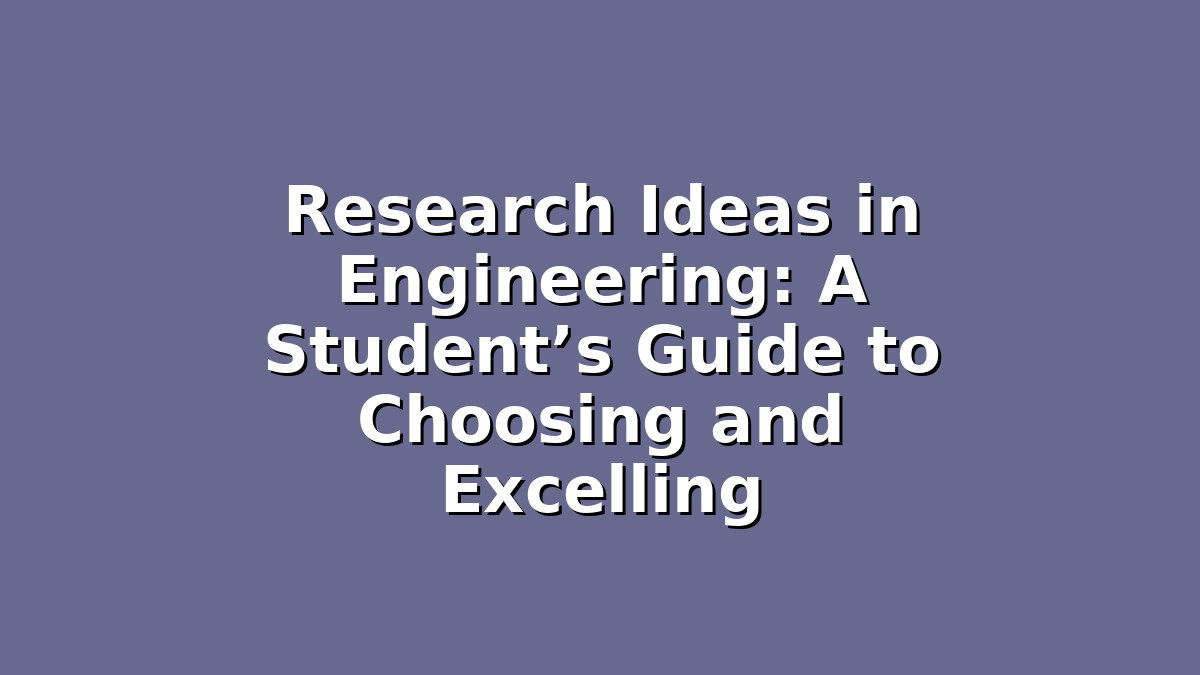Engineering is a vast and dynamic field that offers countless opportunities for innovation and problem-solving. For students preparing for exams or working on projects, selecting the right research idea can be both exciting and daunting. Whether you’re aiming to impress your professors, build a strong foundation for your career, or simply deepen your understanding of engineering concepts, choosing a relevant and feasible research topic is crucial.
In this blog post, we will explore practical research ideas in engineering tailored for students and provide study tips to help you organize your work effectively. From understanding the field’s current trends to managing your time efficiently, this guide is designed to encourage and support you on your academic journey.
1. Exploring Emerging Research Areas in Engineering
One of the best ways to pick a compelling research idea is to focus on emerging areas within the engineering discipline. These topics are not only engaging but also provide opportunities to contribute to cutting-edge developments. Here are three trending fields that students can explore:
a. Sustainable and Green Engineering
As the world shifts toward sustainability, green engineering has become a vital research area. You can investigate renewable energy sources such as solar, wind, or bioenergy, or delve into eco-friendly materials and waste management processes. For example, designing energy-efficient buildings or developing biodegradable materials can make for impactful projects.
Study Tip: Stay updated with scientific journals and engineering magazines like IEEE Spectrum or Renewable Energy Journal to find fresh ideas. Summarize key research findings to build a strong literature review.
b. Robotics and Automation
Robotics and automation continue to revolutionize industries from manufacturing to healthcare. You could research autonomous robots, robotic arm designs, or the integration of artificial intelligence in automated systems. Projects in mechatronics or sensor technology are also exciting avenues to explore.
Study Tip: Break down complex systems into understandable modules. Use diagrams and flowcharts to visualize robot mechanics or control systems, which can help during exams or presentations.
c. Internet of Things (IoT) and Smart Systems
The IoT field connects everyday devices through the internet, creating smarter systems. Research topics might include smart home technologies, wearable health monitoring devices, or wireless sensor networks. Investigating security challenges in IoT devices is another promising area.
Study Tip: Hands-on experimentation is valuable here. Build simple IoT prototypes using platforms like Arduino or Raspberry Pi to gain practical insights alongside theoretical knowledge.
2. How to Narrow Down Your Research Idea
Starting with a broad topic can feel overwhelming. To make your research manageable and effective, you need to narrow down your focus. Here are some strategies:
a. Identify Your Interests and Strengths
Reflect on which areas of engineering excite you the most. Aligning your research with your interests will keep you motivated throughout the project. Also, consider your existing skills—if you’re strong in programming, a topic in software engineering or IoT might suit you better than structural engineering.
Study Tip: Create a list of your favorite subjects and rank them by enthusiasm and expertise. This will help you prioritize topics.
b. Understand the Scope and Resources
Assess the time and resources available to you. Some projects may require specialized equipment or extensive data collection, which might not be feasible. Choose a topic that fits within your academic calendar and access to labs or software.
Study Tip: Discuss your ideas with professors or mentors who can provide practical advice on what’s achievable. Their insights can save you time and frustration.
c. Formulate Specific Research Questions
Convert your broad topic into a clear, focused research question. Instead of “Studying renewable energy,” try “How can solar panel efficiency be improved using nanotechnology?” This approach sharpens your objective and guides your methodology.
Study Tip: Practice writing research questions and hypotheses. This exercise enhances your critical thinking and prepares you for exams that involve research methods.
3. Effective Study Strategies for Research Projects and Exams
Balancing research work and exam preparation can be challenging. Here are some tips to help you manage both effectively:
a. Create a Detailed Study and Research Plan
Organize your time by dividing your workload into smaller, manageable tasks. Set deadlines for literature review, data collection, analysis, and report writing. Also, allocate regular time for exam revision to avoid last-minute cramming.
Study Tip: Use digital tools like Trello or Google Calendar to track your progress. Visual reminders of deadlines can boost productivity and reduce stress.
b. Use Active Learning Techniques
Passive reading is rarely effective for deep understanding. Engage with your study material by summarizing information in your own words, teaching concepts to peers, or creating mind maps. When working on research, document your experiments and reflections meticulously.
Study Tip: Form study groups where members discuss research topics and quiz each other on key concepts. Teaching others is one of the best ways to solidify your knowledge.
c. Seek Feedback and Revise
Don’t hesitate to ask for feedback on your research drafts or exam preparations. Professors, teaching assistants, and classmates can provide valuable perspectives that improve the quality of your work.
Study Tip: Incorporate feedback promptly and schedule revision sessions before exams. Reviewing past papers and sample research reports can also familiarize you with expected formats and question types.
Conclusion
Research in engineering opens doors to innovation, critical thinking, and practical problem-solving. For students preparing for exams or working on projects, selecting the right research idea and applying effective study strategies can make a significant difference in academic performance and confidence. By exploring emerging fields like sustainable engineering, robotics, and IoT, narrowing down your focus thoughtfully, and organizing your study plan efficiently, you set yourself up for success.
Remember, every great engineer started by asking questions and seeking answers one step at a time. Keep your curiosity alive, stay disciplined in your studies, and don’t be afraid to reach out for support when needed. Your hard work and dedication today will pave the way for exciting opportunities tomorrow.

Responses